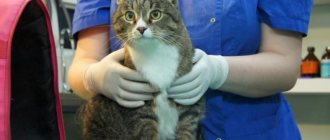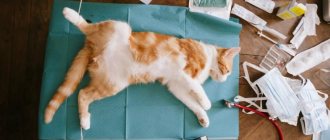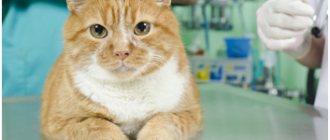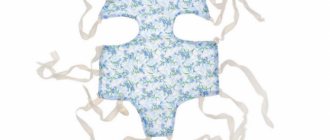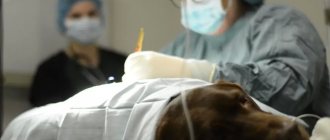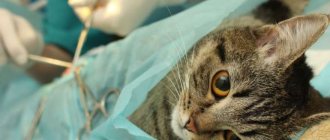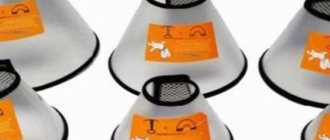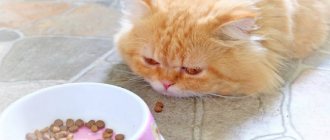Castration of pets is one of the most popular manipulations in veterinary practice, relieving the pet of sexual desire. As a result, the cat’s behavior becomes calmer, the animal does not show aggression and lives 1.5-2 years longer than unsterilized cats. You will no longer have to deal with the unpleasant smell in the house, listen to heartbreaking howls at night and feed your pet so-called harmless hormonal drugs, which often cause the development of oncology and other life-related disorders.
What is cat castration
Castration of cats can be medical or surgical. The result of manipulation is temporary or complete suppression of libido and elimination of the sexual instinct. The most popular is surgery, which is performed under general anesthesia. During the operation, the surgeon removes the testicles (testes) located in the scrotum or, in cryptorchidism, outside it.
The following types of anesthesia are used:
- inhalation;
- local;
- non-inhalation;
- combined method.
The choice of anesthesia depends on the health of the animal and the specifics of the surgical protocol. The optimal age for surgery and painless rehabilitation is from 7 to 9 months.
Medical or chemical castration allows you to do without surgery and anesthesia. During an alternative procedure, an implant with an active substance is implanted under the pet’s skin, which inhibits the production of androgens, changes hormonal levels and behavior. The effect lasts quite a long time - from 6 months to 3 years, there is no need to care for the installation site, no rehabilitation is required. The peculiarity of the procedure is that at any time, if necessary and plans change, the implant can be evacuated, after which the hormonal levels will be restored and the animal will again be ready for mating. Among the disadvantages, one should note the high cost and the presence of a reverse effect during the first 2-4 weeks after installation.
After the operation and the postoperative period, the neutered animal stops marking furniture, which makes it easier to care for and becomes more friendly towards people and other household inhabitants. Owners note an improvement in the furry cat’s psychological state and behavior, and the likelihood of getting injured in street fights over the cat with other males is minimized. Changes in hormonal levels after castration affect the formation of character - street life ceases to be attractive to the cat, so you do not have to close the windows for fear of escape.
What to feed a neutered cat. Nutritional features.
In the first few months, a neutered cat will undergo hormonal changes; during this period, the cat may experience a false feeling of hunger.
At the same time, in cats after castration, energy is spent less, by about one quarter. All this can lead to obesity in your pet.
To avoid this, you should choose a diet for your pet. The usual portion of food that your cat is used to is definitely required and should be reduced by about a third.
You should also remember that the cat’s menu must include: meat, complex carbohydrates, fats, vitamins, minerals and fiber.
Natural nutrition for a neutered cat, what to feed
- Meat or liver of turkey, chicken, duck, rabbit
- Quail eggs
- Vegetables - carrots, tomatoes, broccoli
- Fruits - pears, bananas, apples
- Cereals - oats, peas, rice, lentils
- Dairy products - cottage cheese, sour cream (low-fat), yogurt.
The average daily nutritional intake for a neutered cat is approximately 30-60 grams per 1 kilogram of weight.
What not to feed a neutered cat
The following foods should be completely excluded from the diet:
- meat (lamb, pork, beef)
- potato
- bakery products
- sweets of any kind.
Important!!! It is strictly forbidden to feed a castrated cat fish , especially raw fish.
Fish extracts vitamins B and K from the cat’s body, the lack of which leads to the development of the well-known urolithiasis. This applies not only to castrated or sterilized cats, but to all cats in general.
It is also not recommended to give your cat milk - as in the digestive tract of adult cats, there are no substances capable of processing it.
How is castration performed?
Cat owners most often opt for the classic castration procedure due to its simplicity, affordable cost, short postoperative period and low likelihood of complications. Preparation for surgery involves choosing a clinic, weighing and examining the pet (the list of necessary measures and their features is determined by the doctor individually), and determining medical contraindications. You cannot feed your fluffy 12 hours before the scheduled time of surgery, and you should refuse water 2-3 hours before the procedure.
There are two options for castration:
- doping of the testicular cord with a surgical thread - the surgeon ties the cord with suture material, which does not need to be maintained;
- without the use of a ligature - the spermatic cord in this case is formed into a biological unit, patient care is identical.
After applying anesthesia, the doctor must prepare the surgical field, freeing it from hair, and treat the scrotum and the adjacent area with an antiseptic solution. Next, dissection is performed with a scalpel. The spermatic cords are clamped, and the testes are excised and removed. Considering that the intervention area is small, sutures are not always advisable, and therefore there is no need to care for them. The incision site is treated with an antiseptic; complete healing usually occurs after 7-10 days, subject to the prevention of complications and proper care. At the end of the surgical procedure, the cat remains in the clinic under the supervision of staff who will care for him until he is finally recovered from the state of anesthesia. Typically this period is about an hour or more, subject to the presence of negative effects of anesthesia and other features.
About aggressive animals
Behavioral characteristics, although dependent to a certain extent on the level of sex hormones, are strictly individual. One important point that needs to be said right away.
If your pet is initially somewhat inadequate and aggressive, you should not expect that after castration he will immediately become a calm and affectionate cat.
Yes, over time your pet may become calmer, but this will not happen immediately. For the same Siamese, aggressiveness is a common character trait, and castration practically never corrects it. If a cat has a habit of hissing at its owner and scratching him, then sterilization alone will not cope with this.
However, in some cases, castration can actually have a significant impact on the character of the pet. But this only happens in situations where the operation was performed before puberty. Specific reflex arcs have not yet formed in the pet’s brain, and therefore it can actually grow up calmer when compared with non-castrated fellow tribesmen.
Rules and important care notes for owners
Full recovery and rehabilitation of a pet after surgery requires patience on the part of the owners. Do not force feed or scold the fluffy if he does not have time to reach the tray or relieves himself in the wrong place. Don’t forget that your pet has experienced extreme stress and may experience pain, so surround him with affection and care and let him know that you are nearby and ready to care for him. You should not bathe the animal for a month after surgery - cleaning should be postponed until the postoperative wound has completely healed. You need to care for the wound using wet wipes or cotton pads soaked in water.
Proper care should be provided and the cat’s health should be closely monitored after castration. The following points should alert the owner:
- Even a slight increase in body temperature in the postoperative period should be a reason to contact a veterinarian. A change in temperature may indicate the addition of an infectious process;
- Refusal to eat for more than 24 hours, increasing weakness, lethargy and apathetic behavior - the development of such symptoms jeopardizes the rapid rehabilitation of the animal and requires consultation with your doctor;
- Changes in the appearance of the wound - if you properly care for the wound, the incision site should be dry (except for the first day) without signs of suppuration. If, after 24 hours after castration, bleeding and exudate are observed, you should play it safe and show the cat to a specialist for an examination and organization of competent care;
- Periodically palpate the cat’s abdomen - if during palpation the abdomen is tense and the pet experiences pain, you should suspect the development of complications and seek veterinary help to prevent complications;
- You should also contact a veterinarian if abnormalities in the cardiorespiratory system develop. The development of shortness of breath and rapid heartbeat are serious symptoms that require emergency care, and such a patient must be cared for in a hospital.
To avoid the development of complications and other health problems for your cat, you should follow your doctor’s recommendations during rehabilitation. High-quality care and care will allow the cat to quickly forget about the stress he suffered and recover after castration as soon as possible.
Rehabilitation of a cat after anesthesia
In the first 3 hours after anesthesia, the cat may vomit. This is due to the fact that the body is freed from the effects of drugs in every possible way. The cat will also experience dizziness, hence anxiety, lethargy, and disorientation in space.
The owner can purchase eye drops that will eliminate dryness, since the cat's eyes remain open for some time under anesthesia and there may be discomfort. Also, if the cat was fed solid food, for the first time choose softer, easily digestible food.
Make sure your pet doesn't overeat. At first you may not feel hungry, but then you should start feeding your pet in small portions.
Postoperative suture treatment
If the cat does not have problems with regenerative processes, then the treatment of the seams will consist of disinfectants and drying agents: potassium permanganate, calendula tincture. There are also professional veterinary medications that are used immediately after surgery. It is better to check the names with your veterinarian and buy them at a veterinary pharmacy. They do not irritate, dry out, and stimulate the incision to tighten.
If the cat is castrated using a seamless method, then no further treatments are required throughout the entire rehabilitation.
Use any medications in consultation with your doctor. The main task at this stage is to prevent the cat from damaging the integrity of the seam and causing an infection. Take care of your collar. Otherwise, you will have to take a course of antibiotics.
Remember:
- Inspect the groin area once a day, especially if the pet begins to actively move. Bleeding can be drip, moderate or intense;
- If there is the slightest suspicion of deterioration or suture dehiscence, you should consult a doctor.
Don’t be afraid to raise the alarm: it’s better to be safe than to miss the moment and let the situation get out of control.
Behavior of a cat after anesthesia on the first day
Gradually, the effect of the drugs wears off and the animal begins to show activity. The cat will most likely be thirsty as the effects of the medications stimulate thirst. After 3 hours, you can put a bowl of water so that he can drink on his own as soon as possible.
The room where the cat is should be warm, it is better to place a water-based heating pad next to it and cover it with a towel.
Place the animal in a non-ventilated place, perhaps next to the heating radiator, but so as not to touch the radiator (within a meter, maybe a little further), or place the cat under a towel with a heating pad. At this moment, the pet may become hypothermic, which will then cause a cold and longer healing of the sutures.
The cat may begin to experience a period of restlessness and erratic activity. This is due to the fact that the animal is experiencing discomfort and will try to change place in the hope of eliminating the stress. Protect the kitten from colliding with objects and falling. His orientation in space is now poor, the pet is in fact half asleep and still has poor control of the muscles and vestibular apparatus.
Without care, the cat may get injured and damage the integrity of the surgical sutures.
Do not let the cat on the sofa, carpets, personal belongings or toys - the pet may wet itself due to weakened self-control.
The very next day the cat will regain control of its body, but sudden movements can still cause discomfort. The pet will eat normally and will be able to independently choose a suitable place to rest. If the cat goes into a litter tray, let it be a coking sorbent. Sawdust or low-quality absorbents may stick to the seam area, which is unacceptable.
The first hours after castration
L:.2 —>
We think there is no need to explain that it is necessary to carry out manipulations with an animal in a veterinary clinic. After all, we are talking about surgical intervention. The procedure is performed under local anesthesia. During the operation, the cat sleeps peacefully and does not feel pain. In principle, as soon as the cat wakes up, you can immediately take him home. But veterinarians themselves recommend spending the first hour after surgery in the clinic.
It is necessary to monitor the pet’s condition: monitor the cat’s breathing, assess its general condition, how easily it recovers from anesthesia.
It is necessary to take care of the comfortable transportation of the animal. You will need a specially padded carrier. Disposable diapers are suitable and you won’t mind throwing them away. Under no circumstances should you transport your pet on public transport. If you do not have a personal car, it is better to call a taxi. After all, the cat is now experiencing already serious stress, there is no need to aggravate the situation.
Many clinics offer paid pet stay services, and you may be offered to leave your cat under the supervision of a specialist for the whole day. But you shouldn't do this. During this period, the cat needs your attention and care.
With the veterinarian's permission, carefully place your pet in a carrier and go home.
Price of the procedure
The price of castration of a cat ranges from 1-7 thousand rubles. The minimum is requested by standard budget clinics, and the maximum by private clinics.
A visit from a surgeon to your home is approximately 30% more expensive than an operation in a medical institution. The price partly depends on the region and the condition of the cat. Operating on cryptorchid, for example, is more difficult.
Castration is a simple operation. For comparison, the minimum price tag for sterilization is 3 thousand rubles. The request is due to the duration of the intervention, its complexity, and the cost of medications
Possible complications
Cat behavior and physiology change after castration because... The organ responsible for hormonal balance is removed. The animal rarely shows aggression. However, after anesthesia, unpleasant consequences often occur in the form of vomiting, diarrhea, and involuntary urination. Such complications often pass without a trace and are the body’s response to intervention.
The age for castration also plays a decisive role. The older the pet, the higher the risk of negative consequences. In rare cases, bleeding occurs. But this consequence is associated with errors during surgical intervention.
Sometimes the habit of marking territory may persist, but this complication occurs in isolated cases. This is due to incomplete removal of the gonads and castration at the age of 5-7 years.
Another consequence that may occur is kidney stones. The formation of stones is associated with a metabolic disorder in which uric acid accumulates. Fever may be present for some time after surgery. Most often it subsides already on the 2nd day. If the fever does not go away, this may indicate inflammation, which requires mandatory examination by a specialist and appropriate treatment.
Often, after removal of the gonads, a cat develops obesity. After the intervention, the animal’s appetite increases, the pet becomes not as active as before, which provokes excess weight gain. In this case, the owner must adjust the cat's diet.
All information posted on the site is provided in accordance with the User Agreement and is not a direct instruction to action. We strongly recommend that before using any product, you must obtain a face-to-face consultation at an accredited veterinary clinic.
What if it is necessary to infertize a cat, but cannot castrate him?
There are situations when it is necessary to infertize a cat, but due to age or other reasons, classical castration is contraindicated. In such cases, you can resort to the help of special medications. The market leader today is Suprelorin. It is sewn into the animal’s skin in the form of an implant, after which its sexual activity is gradually suppressed. In addition, today the development of oral agents is already underway to help cope with a cat’s libido without surgically castrating it.
In addition, some breeders are sometimes faced with a situation where there is an adult cat that is no longer desirable to be castrated, but it is also impossible to let him into breeding. Sometimes such animals can be used as living “sensors” to help determine the cats’ readiness for mating. Regular castration is not suitable here. An operation to ligate the vas deferens is required. In this case, the cat completely retains its natural behavior, but can no longer fertilize females.
How to alleviate the condition of an animal
It is important to give your pet more to drink and not to forget about the painkillers prescribed by the veterinarian. Such medications will help the cat get rid of unpleasant symptoms that may be present in the first few days after surgery.
To alleviate the condition after castration, the following groups of drugs may be recommended:
- Antibiotics. Necessary to eliminate infection or if there is a high risk of complications after sterilization of a kitten (for example, swelling and other symptoms). The dose and drug are prescribed by the doctor, based on the age and condition of the animal’s body.
- Vitamins. Helps you recover faster. Often, the doctor prescribes special foods containing vitamins. In this case, the animal returns to normal in a short time.
- Hemostatic medications. Used only in rare cases. If the risk of bleeding is high, then medications that affect the level of platelet aggregation are prescribed.
During the recovery period, the animal may be lethargic, especially after anesthesia. At this time, it is better to leave your pet alone and let him sleep, periodically monitoring his condition.
Do castrati get fat and how do their food preferences change?
There are many myths and misconceptions related to the issue of sterilization of animals. In particular, there is a very widespread opinion about the incredible obesity of castrati and their universal obesity. This is partly true, but deprivation of the testes in itself does not lead to weight gain. The fact is that the body of such an animal begins to require obviously fewer calories. If you feed him the “old” diet, the pet will inevitably begin to accumulate fat. It is enough just to adjust your diet to avoid such consequences.
Note that a lack of sex hormones can still lead to insufficient physical activity. This also leads to the deposition of unnecessary fat in the pet's body. To protect him from this scourge, buy interesting toys. The more your pet jumps and rushes around the apartment, the less likely it is to turn into a “bun”.
Important note: do not give your neuter a lot of fish (or better yet, exclude it from the diet altogether), and also make sure that your pet always has access to clean drinking water. This will save him from urolithiasis (that is, urolithiasis).
An interesting point is that if a cat is castrated before the onset of puberty, then the negative changes described above will bypass him. In such animals, the biochemistry of the body changes significantly, which prevents the development of problems later. In addition, they live much longer and are less likely to suffer from diseases of the reproductive system.


